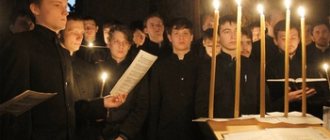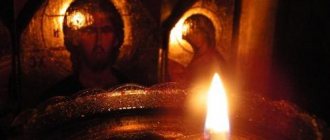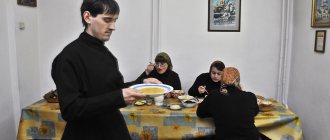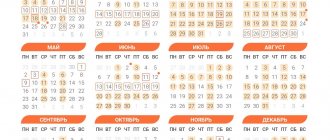Preparation for spiritual feat
No serious business is started without preparation. Having decided to cleanse your body, you will choose an appropriate diet, create a menu and load the refrigerator with the necessary products. Having decided to improve your body, you will think over a training plan. It is logical that the upcoming cleansing and improvement of the soul requires no less thoughtful preparations. This is why the Church has set aside three weeks and four weeks before Great Lent.
Stop. So is it still three or four?..
Both. The fact is that the word “week” in the Church Slavonic language means Sunday - a day of “idleness”, freed from ordinary earthly labors and dedicated to thinking about God. But the term “week” just refers to the week we are used to, seven calendar days running in a row one after another. So no confusion.
What are the preparatory weeks before Lent?
Every significant undertaking begins with preliminary preparation: a great sports victory means years of training, a scientific discovery means months of experimentation, opening a company means the work of many people. Compliance with moral and physical restrictions during Lent is also a “feat” for some. Special days before Lent help prepare for the coming month.
Lent is necessary for cleansing your body, thoughts and soul before Easter. This is painstaking work on yourself, the most difficult, because realizing your mistakes and sins and further abstaining from them is a lot of work. Getting in the right frame of mind, understanding the meaning of the upcoming trials and the depth of spiritual improvement and repentance - this is the main goal of the preparatory weeks. The body also needs to get used to the menu before Easter, so fast days alternate with regular ones, gradually changing the diet to a lean one.
You immediately need to decide on the concepts and rules of the future period. “Week” in Church Slavonic speech means the last day of the week, Sunday, when people are not busy with daily affairs and can devote the whole day to thoughts about the Lord, communication with him and self-improvement. And the usual “week” in our speech, a time period of seven days, is called “week”.
So, preparation for Lent lasts 22 days - three “weeks” and four “weeks” (Sundays). Each Sunday has its own name, and the following week reminds the Christian of this or that sin; certain stichera are performed in the church and various restrictions on food are introduced.
First week
The first week before Great Lent (remember, we are talking about Sunday) is dedicated to the parable of Jesus Christ about the publican and the Pharisee. The first of them, entering the temple, bitterly repented of his sins and asked the Lord to forgive him. The second, confident in his own piety, thanked God for the fact that he was not like other sinners. Need I say that it was not the Pharisee, swollen with narcissism, who received forgiveness, but the repentant publican?
Repentance cannot be replaced by any donations
This parable is intended to remind us of the harmfulness of pride, which hinders our spiritual growth, and of the benefits of repentance - the ability to soberly look at oneself from the outside, notice in time the bad impulses of the soul and heart, recognize them, repent of them and try to eradicate them. And don’t be afraid to sincerely ask for forgiveness: from God, or from our neighbor who has been offended by us...
In the 2022 Lent calendar, the first week falls on February 13, and the first week lasts from February 14 to 19 and is called Omnivorous or Continuous. There are no fast days; from Monday to Sunday you are allowed to eat any food, including meat and dairy products.
The Week of the Publican and the Pharisee
The first preparatory Sunday is called “About the Publican and the Pharisee”; at the liturgy on this day the corresponding parable is read. This is a short story about how two people of different classes prayed in church - a Pharisee and a tax collector. The appeals to God of these two people were different: the Pharisee asked the Lord for gratitude for his humility, he gives tithes, fasts and does not take what belongs to others, unlike others; The publican asked for forgiveness without raising his eyes, he repented of his misdeeds and wanted mercy.
The first week sets the tone for the entire fast - everyone should be humble. It is not comparing our positive actions with the mistakes of others that gives us mercy, but only identifying our own mistakes and true repentance for them will help us improve for the better. Pride in one's achievements interferes with spiritual purification and growth, and true repentance is the ability to coolly evaluate one's actions, looking at them from the outside.
The next seven days are “omnivorous”; you can eat everything without fasting.
Second week
The second preparatory week before Lent refers us to the story of the Prodigal Son. Having begged his father for his share of the inheritance, the young man went to distant lands, where he squandered all the wealth he had received and returned to his parent beggars, lost and full of repentance. And he was received with great joy by his father, who did not even think about wasted money, but was only glad that his prodigal son was finally home, alive and unharmed.
The one who loves is ready to accept us in any way
What lesson can be learned from this parable? First of all, she calls on believers to never fall into despair and not give up. If in the previous week a person’s main task was to mentally go through his bad deeds and condemn them with all his soul, then this week one should remember: the Lord forgives everyone who comes to him with sincere repentance.
Just as an earthly father greeted with rejoicing his son who had gone astray, but was therefore no less beloved, so the Heavenly Father is ready to joyfully accept each of his children. Even if now it seems that we are mired in sins “to the very top”, a return to a pure righteous life is impossible, and sometimes going to church is ashamed from the abundance of dirt accumulated in the soul...
There is always One who is only waiting for our request to lend a hand and help us get onto solid ground. The main thing is to gather your courage and not be afraid to turn to Him.
In 2022, the Week of the Prodigal Son falls on February 20, and the week lasts from February 21 to February 27. It is called Motley, since the usual “fast” days alternate at this time with fasting Wednesdays and Fridays. On Mother's Saturday, memorial services for the dead are held in churches, and parishioners try to visit cemeteries to honor the memory of the deceased.
Sunday before Lent
The last day of the preparatory days is the week of Cheese Fat or Forgiveness Sunday. After long celebrations, people gather in church. During the service, they remember the expulsion of Eve and Adam from Paradise, as if reminding that even though man has departed from God, everyone always has their own unique opportunity to return to the Father, reconsidering their actions, words and thoughts.
At the end of the liturgy, the clergyman asks for forgiveness. Following his example, all Christians ask each other for forgiveness. In response, you need to forgive and let go of all the grievances that haunt your head. Forgiveness is an important step towards relieving the soul from difficult thoughts; you need to enter into fasting without all the offenses.
This is the last day when you can eat butter and fish; Lent begins tomorrow.
Third week
No one will be able to escape the final trial
The last week before Lent is designed to make people turn their thoughts to the final Judgment that awaits everyone, and to think that one day all our words and actions will be weighed and assessed by God himself. And we will have to bear responsibility for them!
The task of this week is to convey to people a simple understanding: one cannot indulge in carelessness, hoping for God’s forgiveness, since repentance alone, without effort on our part, means little. Right now, when Great Lent is approaching, the time is coming to change for the better, to adjust our behavior, thoughts, deeds, so that later, at the Last Judgment, we will have something to say in our defense.
In 2022, the Week of the Last Judgment falls on February 27. The week following it is called Cheese Week, Meat Week, and in the folk calendar - Maslenitsa.
Just by the name it’s easy to guess what you can eat in the week before Lent , and what you can’t (we’re talking about the secular week, the week). Until Monday, believers are allowed to eat any dairy products and eggs, but meat is already prohibited. And church services on Wednesday and Friday become longer and more solemn, emphasizing: a little more, and the time for spiritual labor will come...
Cheese week ends with a noisy celebration!
The Meat Empty Week ends with Forgiveness Sunday, immediately followed by fasting. On this day, modest food appears on the table for the last time, with the exception of meat dishes, and the Church remembers Adam and his expulsion from Paradise. This is done to remind believers: although a person once fell away from God, there is an opportunity to return to Him, bringing purity to his thoughts, words and actions. On this day, a special service is performed, at the end of which everyone, starting with the priest, asks each other for forgiveness in order to enter into fasting without unnecessary heaviness in the soul.
Maslenitsa week
Week after the week of the Last Judgment, Maslenitsa, each day has its own characteristics and holiday traditions. Already on Monday they begin to bake pancakes in preparation for the upcoming festivities; the very first pancake was given to a beggar so that he could “remember” his deceased relatives.
On Tuesday, festivities, snowball fights, horse sleigh rides and slides begin. Wednesday is pancake day at the mother-in-law's place; fasting is canceled on this day, as is Friday, when the mother-in-law comes for a return visit. Fathers-in-law came to visit not only to visit the young people, but also to give them worldly advice, sharing with them their wisdom and experience in running a household.
Thursday is the “official” opening day for entertainment events. The revelry began in the morning and everyone wanted to take part in sports events, dancing and snow fights. On Saturday, Maslenitsa fun continued, in addition, the young wife invited her sister-in-law to visit for tea and homemade cakes.
Cheese week: what it means and existing traditions
Cheese week is the last Sunday before the start of Lent, and it is on this day that cheese week ends, which has another name - Maslenitsa. During these seven days you cannot eat meat.
The word week in this phrase has a completely different meaning - it means the day of the week, that is, Sunday. Raw food means that you can eat dairy products, eggs and fish, but meat is already prohibited. And the meaning behind this is that these products seem to be released to make it easier to abstain during fasting. Thanks to this preparation, the human body makes it easier to switch to lean foods.
Bright Sunday
Lent in the Christian religion has two special meanings. Believers repeat the wanderings of Jesus Christ in the desert, during which he was purified physically and spiritually before fulfilling the Great Mission, this also includes concern for the salvation of his own soul and the purification of his body.
People come to this multi-day ritual only on a voluntary basis, with full awareness of the need to undergo it. The menu of each week depends on the requirements, on some days they are more severe, on others (for example, on major holidays), some relaxation is given.
Holy Week is the last seven steps that must be passed through patiently and with dignity, without violating the canons, if the purpose of fasting is to enter physically and spiritually prepared into the most significant holiday in Orthodoxy and rejoice at the Resurrection of the Lord.
When is Trinity celebrated in 2022?
Trinity Day is celebrated in 2022 on Sunday, June 12th.
Trinity is one of the 12 main Orthodox holidays. The date of the Trinity celebration varies - it is celebrated on the 50th day after Easter. In 2022 it falls on June 12.
The holiday symbolizes the unity of the Holy Spirit, God the Father and God the Son. Trinity is famous for the descent of the Holy Fire on the apostles and the Virgin Mary. After this event, the apostles received the gift of speaking in different languages in order to preach the teachings of Christ to the nations of the world.
The holiday is celebrated for 3 days. On the day of the Holy Trinity, it is customary to bring a young birch branch to church for lighting. The branches are then brought home and left to protect the family and home. On the eve of Trinity, it is customary to remember the dead, go to cemeteries and leave treats for the spirits.











